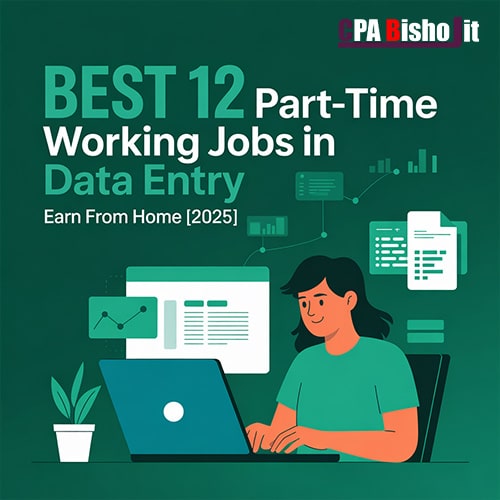Best 12 Part-Time Working Jobs in Data Entry [2025]

When I first started looking for ways to earn money from home, I knew I needed something flexible that wouldn’t require too much of my time. That’s when I found part-time data entry jobs. These roles are ideal for individuals seeking additional income without the commitment of a full-time job. In fact, a recent survey reveals that 40% of workers prefer remote and flexible jobs, with data entry positions being a top choice.
By 2025, these jobs will be even more accessible, offering opportunities to work from home with flexible hours. Whether you’re a student, a stay-at-home parent, or just looking for a side hustle, there’s a part-time data entry job for you. Let’s dive into the 12 best options available this year!
Best 12 Part-Time Working Jobs in Data Entry: Earn from Home [2025]
1. Freelance Data Entry Specialist
When I first started freelancing as a data entry specialist, I struggled to find clients and manage my time effectively. It felt overwhelming to start from scratch, but once I got the hang of it, I realized how flexible and rewarding the process could be. As a freelance data entry specialist, you work on your own terms, choosing which projects to take on and when to work.
The most significant benefit for me was the ability to set my schedule. I could work around other commitments and even take breaks whenever I needed. Freelancing gave me control, which was a game-changer compared to a typical 9-to-5 job. It was tough at first—there’s always that worry of not having steady work—but over time, I built up a client base and got regular gigs.
To get started as a freelance data entry specialist, platforms like Upwork and Fiverr are great places to find clients. It’s essential to establish a strong profile and begin with small projects to gradually build your portfolio. Once you’ve proven yourself, clients will start coming back to you with more work. Focusing on a niche, such as medical or legal data entry, helped me stand out and attract higher-paying projects.
2. Remote Data Entry Clerk
When I transitioned to remote work, the biggest challenge was figuring out how to stay disciplined without the office structure in place. But remote data entry jobs, especially for entry-level positions, are a great way to ease into the work-from-home lifestyle. As a remote data entry clerk, you’re responsible for entering data into systems or spreadsheets, updating customer records, or maintaining databases—all from your home.
One of the most significant benefits of working as a remote data entry clerk is the ability to eliminate commuting and save time. I remember how much stress and time commuting used to add to my day. Working from home gave me the freedom to create a comfortable workspace and have a better work-life balance. You’ll also be paid on an hourly basis or per project, and since many companies allow you to choose your hours, it’s a flexible role.
To get started, check out job boards like Indeed or Glassdoor. These websites often have listings for remote data entry positions, and many companies don’t require prior experience. I found that applying to companies directly worked better than waiting for job ads to appear. Don’t hesitate to apply for roles even if they seem a bit outside your comfort zone—you’ll learn quickly on the job, and remote roles often come with training opportunities.
3. Medical Data Entry Specialist
When I first explored the field of medical data entry, I didn’t have the right background. But I quickly learned that you don’t need to be a doctor to work in this field. As a medical data entry specialist, your job is to enter medical records, patient Information, prescriptions, and insurance details into secure databases. It requires precision and an understanding of medical terminology, but with some basic training, you can get started.
One of the significant benefits of this role is that the medical industry is experiencing substantial growth, which translates to job security and a steady demand for professionals. I remember how I felt once I gained some familiarity with the terminology and software – it was empowering. Not only was I able to help healthcare providers keep accurate records, but I was also earning a steady income without needing a medical degree.
Suppose you’re looking to enter the field of medical data entry. In that case, many companies provide training, and you can even take online courses to learn the basics of medical terminology. Look into platforms like CareerStep or local healthcare providers that offer data entry positions. It’s a niche area that can provide an outstanding balance of flexibility and solid pay.
4. Online Survey Data Entry
Online survey data entry was one of the easiest ways for me to dip my toes into the data entry world. It’s simple – you fill out surveys based on your experiences or provide feedback on products and services. But there’s more to it than just answering questions. You’re helping companies collect valuable data that can shape their products and services.
I started doing online survey data entry as a side hustle to earn some extra income. What I found most appealing was its flexibility. I could fill out surveys during my downtime, and the tasks were never too demanding. The pay is usually modest, but it can add up over time if you’re consistent. Plus, it’s an easy way to get used to working in data entry without having to worry about complex tasks or tight deadlines.
To get started with online survey data entry, sites like Swagbucks, Pinecone Research, and InboxDollars are good places to check out. While you won’t make a fortune from surveys alone, it’s a great way to get some extra cash while working from home.
5. Data Transcriptionist
Becoming a data transcriptionist was one of my most rewarding experiences in data entry. It involves listening to audio recordings and typing out the Information accurately. The job is straightforward but requires excellent listening skills and a fast typing speed. What I loved about transcription was the challenge of getting every word right, even when the audio quality wasn’t perfect.
This job is perfect if you prefer working independently and enjoy tasks that require focus. I recall the first time I transcribed a medical interview; it was challenging at first, but I improved with practice. I also appreciated the flexibility to choose the types of transcription jobs I took on, whether they were general, legal, or medical transcription. There’s flexibility in what you can choose based on your interests and skills.
If you want to get started, there are transcription platforms like Rev, TranscribeMe, and Scribie that offer a range of projects. These platforms also provide training, which is especially helpful if you’re new to transcription. The more you practice, the faster you get, and eventually, you can earn a reasonable rate for your work.
6. E-commerce Data Entry Clerk
I remember my first experience working as an e-commerce data entry clerk. It wasn’t the most glamorous job, but it was one of the most practical. As an e-commerce data entry clerk, your primary responsibility is to manage product listings, enter product details, update prices, and keep inventory records accurate. If you’ve ever shopped online and wondered how all those details end up on a product page, it’s data entry clerks who make that happen.
The great thing about e-commerce data entry is that it’s in high demand, especially with the boom in online shopping. This job is ideal for anyone looking to work part-time, as many e-commerce platforms allow flexible hours. You’ll get to learn a lot about the e-commerce industry, which is a huge plus if you’re interested in online retail.
Getting started is easy—sites like Amazon, Etsy, and Shopify regularly hire e-commerce data entry clerks, and some even offer remote positions. For beginners, it is helpful to be comfortable with spreadsheets and basic HTML, but many companies provide training. This role can evolve into more specialized positions, such as inventory management or product optimization, if you wish to expand your skill set over time.
7. Customer Service Data Entry
Working as a customer service data entry specialist might be one of the most straightforward roles in data entry, and I’ve found it to be gratifying. In this role, you enter customer orders, track customer interactions, and keep records of complaints or requests. While customer service data entry may seem simple, it requires a thorough understanding of customer needs and meticulous attention to detail.
What I loved about this role was how quickly I could see the impact of my work. When a customer made a purchase or submitted a request, it was satisfying to know that my data was helping streamline the process. Additionally, many of these roles offer flexibility in terms of hours. They can be performed from home, which is a significant benefit.
To get started, many companies—especially in retail, telecommunications, and tech—are constantly hiring customer service data entry specialists. Websites like Indeed or Glassdoor frequently list such positions. If you enjoy helping people and have a knack for managing data, this could be a great fit. It’s a solid part-time option that also teaches valuable customer service skills.
8. Social Media Data Entry Specialist
As someone who spends a lot of time on social media, I was naturally drawn to social media data entry roles. These jobs involve inputting data from social media platforms into a company’s database, updating posts, tracking engagements, and ensuring accurate reporting. It’s not just about typing; it’s about understanding how social media works and how it connects to customer interactions.
I began by managing simple tasks, such as updating social media calendars and inputting performance metrics from platforms like Instagram, Twitter, and Facebook. Over time, I discovered that these roles could evolve into more strategic positions, enabling companies to analyze social media performance and create content tailored to audience engagement.
For anyone looking to get into social media data entry, platforms like LinkedIn or Glassdoor are great places to start. You don’t necessarily need a background in marketing. Still, familiarity with social media tools like Hootsuite or Buffer can be helpful. These positions are ideal for individuals passionate about social media who seek to earn a living by managing and analysing digital content. Plus, many of these roles are remote, which is always a plus.
9. Excel Data Entry Clerk
The first time I used Excel for data entry, I was a bit intimidated. However, as I worked with it more, I realized how powerful and useful Excel is for organizing and entering data. As an Excel data entry clerk, you’ll be responsible for managing spreadsheets, entering data accurately, and performing basic functions like sorting, filtering, and creating simple formulas.
The benefit of this role is that it allows you to build strong Excel skills, which are highly valued in almost every industry. The more comfortable I became with Excel, the more job opportunities became available to me. Whether you’re working with customer Information, financial data, or inventory lists, Excel is the go-to tool for the job.
To get started, you don’t need to be an Excel expert, but it’s essential to know how to use basic functions like VLOOKUP, SUMIF, and pivot tables. Many companies offer on-the-job training, so if you’re familiar with Excel but need a bit of brushing up, you can easily improve your skills as you go. If you want to find these jobs, search on job boards like Indeed, LinkedIn, or SimplyHired for “Excel data entry clerk” or similar titles.
10. Data Mining Assistant
Suppose you’ve ever wondered how companies gather Information from the internet or databases. In that case, data mining is the process behind it. As a data mining assistant, your job is to collect, organize, and analyze data from various sources to help companies make informed decisions. This role involves using tools to search for specific Information, entering it into databases, and ensuring the accuracy of the data.
I started working as a data mining assistant on a project, which provided me with a behind-the-scenes look at how companies utilise data to enhance their operations. The role required attention to detail, and a bit of patience, but the process was fascinating. The best part is that the demand for data mining is growing, especially as more companies realize the value of data-driven decision-making.
To get started, you’ll need to be familiar with tools like Google Sheets, SQL, or Python, depending on the complexity of the job. While entry-level tasks may not require advanced technical knowledge, it’s helpful to have an understanding of how data can be organised and utilised effectively. Search for these jobs on job boards or check out freelance platforms like Upwork or Freelancer for data mining gigs.
11. Data Entry for Non-Profits
I never considered working with non-profits until I discovered data entry roles in this field. As a data entry specialist for a non-profit, you’ll be responsible for entering donation records, tracking volunteers, updating donor Information, and keeping reports organized. The beauty of this role is that you’re not just entering data—you’re helping a cause you care about.
For me, the most rewarding part was knowing that my work directly contributed to supporting a mission. I was able to utilize my skills to help an organization make a meaningful difference, which gave my work a more profound sense of purpose. Plus, non-profits often offer flexible hours, making this a great part-time option.
If you’re passionate about making a difference and want to contribute while earning, look into data entry positions at non-profits. Websites like Idealist, VolunteerMatch, and even job boards like Indeed often list these roles. It’s a fantastic way to combine your data entry skills with a cause you believe in.
12. Product Data Entry
Product data entry was one of the most hands-on data entry jobs I took on, and it turned out to be a great way to gain experience in the e-commerce industry. In this role, you’ll be responsible for entering detailed product descriptions, pricing, specifications, and images into online databases or e-commerce platforms like Shopify, Amazon, or eBay.
What I found most interesting about product data entry was the variety of products I worked with. From tech gadgets to clothing, each product required meticulous attention to detail to ensure everything was accurate. This role also involves ensuring the data is optimized for search engines, so a basic understanding of SEO can be helpful.
To get started, look for job postings on e-commerce platforms like Shopify or Amazon or check freelance job boards for opportunities. It’s a role that can lead to more specialized positions in e-commerce management, inventory control, or even marketing. And if you enjoy working with products and technology, product data entry can be a fun and fulfilling job to pursue.
Benefits of Part-Time Working Jobs in Data Entry
Flexibility in Work Hours
When I first started looking for part-time data entry work, the flexibility in hours was one of the main reasons I was drawn to it. As someone with a busy schedule, I needed a job that didn’t tie me down to a strict 9-to-5 routine. With data entry, you get to choose your hours and work at times that suit you best. Whether you’re an early riser or a night owl, data entry roles can easily fit around your life.
The flexibility allowed me to balance my personal commitments while earning an income. I remember feeling relieved when I realized I didn’t have to choose between work and other essential things. It was a game-changer. If you have a busy lifestyle or other obligations, part-time data entry work offers a great way to earn money without the rigid schedule of a traditional job.
Work-from-Home Opportunities
One of the best parts about part-time data entry jobs is that they often allow you to work from home. Working from home is a huge benefit. Not only does it save time and money (no more commuting!), but it also enables me to create a comfortable and productive workspace that suits my needs. Working from home helped me avoid distractions typically found in an office setting and gave me more control over my environment.
For many data entry jobs, all you need is a reliable internet connection and a computer. This flexibility means you can work from anywhere: your home office, the couch, or even a local café. It’s beneficial if you’re looking to earn income without being tied to a specific location. If you value the ability to work from home and manage your own space, data entry jobs can be the perfect fit.
Low Barrier to Entry
Another significant advantage of part-time data entry jobs is the low barrier to entry. When I started, I had no special qualifications or experience. I didn’t need a degree or advanced skills to get started—just the ability to type accurately and manage data. Most data entry roles require minimal experience and offer training so you can quickly learn on the job.
This makes data entry an excellent option for individuals looking to switch careers or for those who want to establish a foothold in the remote work industry. Whether you’re a student, stay-at-home parent, or just someone looking to earn extra income, data entry jobs are accessible to just about anyone. You don’t need a high level of expertise to start, which is something I found incredibly appealing when I first began. The more experience you gain, the more specialized and higher-paying roles become available to you.
Conclusion
Part-time data entry jobs offer flexibility, the ability to work from home, and a low barrier to entry, making them an ideal choice for many. Whether you’re looking for extra income, a career change, or need more control over your work hours, these roles provide valuable opportunities. From freelance positions to e-commerce and medical data entry, there’s something for everyone. Start exploring these options today and find the perfect part-time data entry job that fits your lifestyle.
Frequently Asked Questions (FAQs)
1. What are part-time data entry jobs?
Part-time data entry jobs involve entering, updating, and managing data for companies. These jobs are flexible, often remote, and don’t require specialized education or experience, making them accessible to a wide range of people.
2. Do I need experience for part-time data entry jobs?
Many part-time data entry jobs don’t require previous experience. Basic typing skills, attention to detail, and the ability to work efficiently are the most critical requirements. Some employers may provide on-the-job training.
3. How much can I earn from part-time data entry jobs?
Earnings vary depending on the job and your experience. On average, you can expect to earn between $10 to $20 per hour. Freelance roles and specialized positions, such as medical data entry, may offer higher pay.
4. Where can I find part-time data entry jobs?
You can find part-time data entry jobs on job boards like Indeed, Glassdoor, and LinkedIn. Freelance platforms like Upwork and Fiverr also offer a wide range of data entry opportunities. Many companies also post listings on their websites.
5. Can I work from home in data entry jobs?
Yes, most part-time data entry jobs allow you to work from home. These roles are ideal for individuals seeking to avoid commuting and establish a flexible work environment. All you need is a reliable internet connection and a computer.
6. What skills do I need for part-time data entry jobs?
The primary skills required for data entry jobs include accuracy, a fast typing speed, attention to detail, and basic computer proficiency. Familiarity with software like Excel or Google Sheets is often helpful, but many companies provide training for beginners.
7. Are part-time data entry jobs a good side hustle?
Yes, part-time data entry jobs are an excellent side hustle. They offer flexibility, can be done remotely, and provide steady income. It’s a great way to earn extra money with minimal time commitment.





